Volkswagen Group Bundle
Who Buys Volkswagen? Unveiling the Group's Customer Secrets
The automotive landscape is rapidly changing, and Volkswagen Group is at the forefront, especially with its electric vehicle (EV) ambitions. Understanding its customer demographics and target markets is critical for Volkswagen's future success. This insight is key to navigating the evolving consumer demands and global shifts towards sustainable mobility solutions.
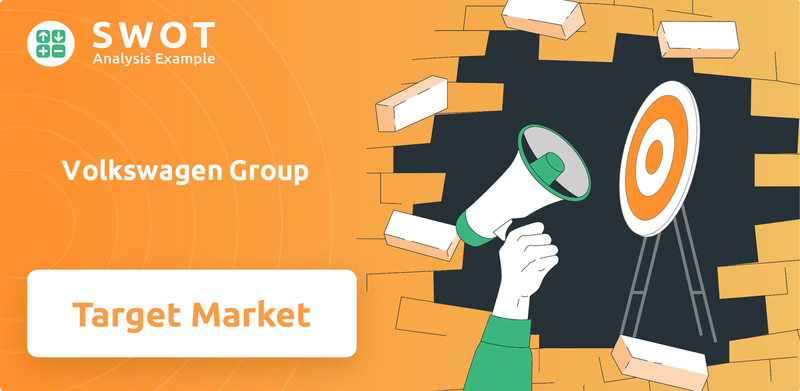
From its origins as a mass-market provider to its current multi-brand strategy, Volkswagen Group has dramatically evolved its approach. Today, the company's diverse portfolio, including brands like Audi and Porsche, caters to a broad range of consumers, from budget-conscious buyers to luxury enthusiasts. This analysis explores the Volkswagen Group SWOT Analysis, delving into the specifics of its customer base, including demographics, psychographics, and buying behaviors, to understand how Volkswagen strategically aligns its offerings to its target audience.
Who Are Volkswagen Group’s Main Customers?
The primary customer segments of the Volkswagen Group are diverse, spanning both business-to-consumer (B2C) and business-to-business (B2B) markets. This diversification reflects the group's strategy to cater to a wide range of consumer needs and preferences across various brands. Understanding the customer demographics of Volkswagen is crucial for tailoring products and marketing efforts effectively.
In the B2C segment, the group's brands target distinct customer profiles. Volkswagen's core brand focuses on middle-income families and individuals, while Audi and Porsche cater to higher-income demographics. Škoda and SEAT attract budget-conscious buyers, often in emerging markets. The Volkswagen target market is segmented to maximize market penetration across different income levels and lifestyle preferences.
The B2B segment includes commercial vehicles, with Volkswagen Commercial Vehicles targeting businesses of various sizes. These customers prioritize cost-effectiveness and durability. The group's focus on electric vehicles (EVs) is a significant shift, driven by consumer demand and government incentives. This evolution highlights the dynamic nature of the Volkswagen group audience.
The core customer base for the Volkswagen brand typically includes individuals and families aged between 25 and 55. They often prioritize reliability, safety, and practicality. These buyers seek a balance between affordability and quality, with a growing interest in fuel efficiency and electric powertrains. The Volkswagen customer profile includes a mix of urban and suburban residents.
Audi and Porsche cater to higher-income demographics, generally aged 35 to 65. These customers value luxury, performance, and advanced technology. They often include professionals, executives, and entrepreneurs. These buyers have higher disposable incomes and a preference for premium features and driving dynamics. The Volkswagen buyers segment includes luxury car enthusiasts.
Škoda and SEAT attract budget-conscious buyers, including younger individuals and families. They often reside in emerging markets. These customers prioritize value, practicality, and modern design. The Volkswagen customer profile includes a mix of urban and suburban residents. The Volkswagen market segmentation includes value-driven consumers.
Volkswagen Commercial Vehicles targets businesses of various sizes. These customers prioritize durability, cost-effectiveness, payload capacity, and after-sales service. The Volkswagen group target audience by vehicle type includes businesses needing vans for logistics. The B2B segment is crucial for the group's revenue. The Volkswagen car ownership demographics include businesses and fleets.
The shift towards electric vehicles is a key trend. Volkswagen aims for 80% of its European sales to be electric by 2030, and 50% in China and North America. This strategic pivot reflects the growing demand for sustainable mobility solutions. This also highlights the importance of understanding the Competitors Landscape of Volkswagen Group in the evolving automotive market. The Volkswagen customer age range is expanding as EVs attract younger buyers. The Volkswagen customer buying behavior is changing with the rise of EVs.
Volkswagen's primary customer segments include middle-income families, higher-income individuals, and budget-conscious buyers. The B2B segment focuses on businesses needing commercial vehicles. The customer interests and hobbies of Volkswagen buyers vary depending on the brand.
- Middle-income families seeking reliability and affordability.
- High-income professionals valuing luxury and performance.
- Budget-conscious buyers prioritizing value.
- Businesses requiring commercial vehicles.
Volkswagen Group SWOT Analysis
- Complete SWOT Breakdown
- Fully Customizable
- Editable in Excel & Word
- Professional Formatting
- Investor-Ready Format
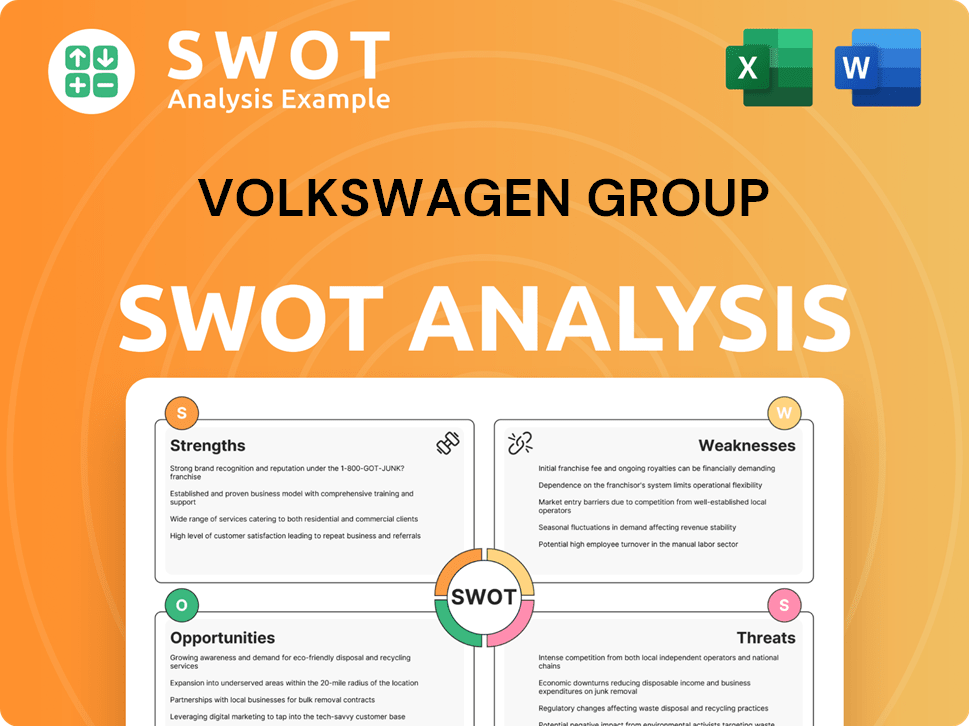
What Do Volkswagen Group’s Customers Want?
Understanding the customer needs and preferences is crucial for the success of the company. The company's diverse brand portfolio caters to a wide range of customer needs, from practical considerations to aspirational desires. This approach allows the company to effectively target different market segments and maintain a competitive edge in the automotive industry.
The primary drivers for customers include reliability, safety, and strong resale value. However, the specific needs and preferences vary significantly across different brands and models. The company continually adapts its offerings and marketing strategies to meet evolving customer expectations and maintain brand loyalty.
The company's strategy focuses on understanding the nuances of each segment to tailor its products and services effectively. By addressing specific customer needs, the company aims to strengthen its market position and foster long-term customer relationships. This approach is essential for sustaining growth and adapting to the dynamic automotive landscape.
Volkswagen buyers often prioritize practicality, including fuel efficiency and spaciousness. They are driven by considerations such as the total cost of ownership and brand reputation. Their purchasing behavior is influenced by online research and dealership visits.
Audi and Porsche customers are motivated by sophisticated design, advanced technology, and performance. Status, self-expression, and the enjoyment of driving are key psychological drivers. Premium ownership experiences and personalized service are also important.
The company addresses pain points such as range anxiety in EVs through continuous improvements in battery technology. Marketing emphasizes the emotional connection and aspirational lifestyle associated with its premium brands. The company is investing in charging infrastructure partnerships.
The Volkswagen ID. Buzz caters to a nostalgic yet forward-looking customer base. This model targets customers seeking a unique, sustainable, and versatile vehicle for leisure and family use. The ID. Buzz exemplifies the company's focus on innovation and customer-centric design.
Loyalty is often tied to the premium ownership experience, personalized service, and continuous innovation. Advanced infotainment systems and autonomous driving capabilities are significant draws. The company focuses on maintaining high customer satisfaction levels.
The company adapts its offerings and marketing strategies to meet evolving customer expectations. By understanding the nuances of each segment, the company tailors its products and services effectively. This approach strengthens its market position and fosters long-term customer relationships.
The company's approach to understanding customer needs and preferences is multifaceted, focusing on both the practical and emotional aspects of car ownership. This involves continuous market research, analysis of customer feedback, and adaptation of product offerings and marketing strategies. For instance, the company's investment in electric vehicle technology and infrastructure reflects its commitment to meeting the growing demand for sustainable transportation solutions. The company's success in the automotive market is closely tied to its ability to understand and respond to the diverse needs and preferences of its global customer base. To learn more about the company's overall strategy, consider reading about the Growth Strategy of Volkswagen Group.
The company's customer base exhibits varied preferences and needs, segmented by brand and model. These preferences influence purchasing decisions and brand loyalty. Understanding these factors is critical for product development and marketing strategies.
- Reliability and Safety: Foundational expectations across all brands.
- Fuel Efficiency and Practicality: Key for Volkswagen brand buyers.
- Performance and Technology: Prioritized by Audi and Porsche customers.
- Resale Value: A significant factor in purchase decisions.
- Sustainability: Growing importance, reflected in EV investments.
Volkswagen Group PESTLE Analysis
- Covers All 6 PESTLE Categories
- No Research Needed – Save Hours of Work
- Built by Experts, Trusted by Consultants
- Instant Download, Ready to Use
- 100% Editable, Fully Customizable
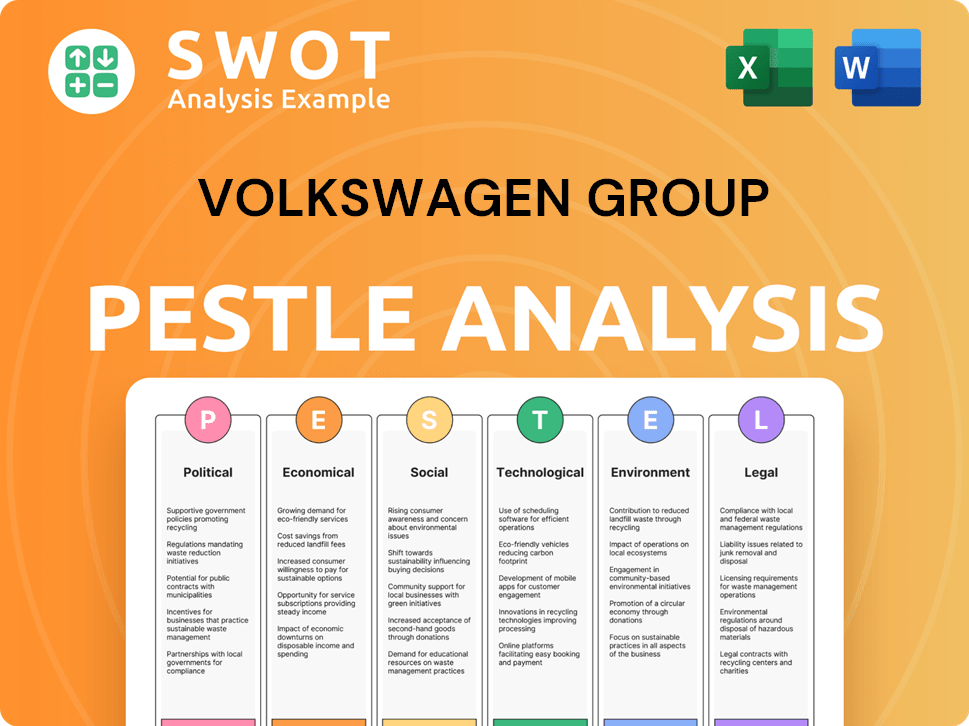
Where does Volkswagen Group operate?
The geographical market presence of the Volkswagen Group is extensive, with key regions including Europe, China, and North America. Europe serves as a cornerstone, benefiting from strong brand recognition, especially in Germany, the UK, France, and Spain. In 2023, the Volkswagen Passenger Cars brand delivered approximately 2.8 million vehicles globally, with a significant portion of these sales occurring within Europe. The company's footprint is substantial, with European new car registrations reaching 2.97 million units in 2023, marking a 12.7% increase compared to 2022.
China is the single largest market for the Volkswagen Group, where it has a long-standing presence and numerous joint ventures. The company adapts its offerings to the preferences of Chinese consumers, who often prioritize spacious interiors, advanced connectivity, and electric vehicles. In 2023, the Volkswagen Group delivered 3.2 million vehicles in China, a 1.6% increase from the previous year. North America, particularly the United States, is a key growth market, where the company is expanding its EV portfolio and manufacturing capabilities.
Differences in customer demographics and preferences are notable across these regions. Europe emphasizes compact and efficient vehicles, with a growing demand for EVs due to emissions regulations. China favors larger sedans and SUVs, with rapid adoption of digital technologies. North America, particularly the US, has historically preferred larger vehicles, though the shift towards EVs is gaining momentum. To cater to these diverse markets, the company develops region-specific models, adapts marketing campaigns, and establishes local production facilities. For more context, explore the Brief History of Volkswagen Group.
In Europe, the focus is on compact and efficient vehicles due to high fuel costs and environmental concerns. Customer demographics include a wide range, from young professionals to families. The demand for EVs is growing, influenced by government incentives and environmental awareness.
China prefers larger sedans and SUVs, reflecting a desire for space and status. The target market includes affluent individuals and families. There's a rapid adoption of digital technologies and a growing interest in EVs, supported by government policies.
North America, particularly the US, has historically favored larger vehicles like SUVs and pickup trucks. The customer base includes a mix of families, professionals, and outdoor enthusiasts. The shift towards EVs is gaining momentum, driven by technological advancements and environmental concerns.
The company localizes its offerings by developing region-specific models, adapting marketing campaigns, and establishing local production facilities. This approach reduces costs and enhances responsiveness to regional demands. Recent expansions include increased investment in EV production facilities globally.
The European market sees a diverse customer base, including young professionals, families, and environmentally conscious buyers. The age range varies, but there's a strong interest in fuel efficiency and lower emissions. Income levels are diverse, with a focus on value for money.
In China, the customer base includes affluent individuals and families seeking luxury and technological features. The age range is broad, with a preference for spacious interiors and advanced connectivity. Income levels are generally higher, with a focus on status and innovation.
Volkswagen Group Business Model Canvas
- Complete 9-Block Business Model Canvas
- Effortlessly Communicate Your Business Strategy
- Investor-Ready BMC Format
- 100% Editable and Customizable
- Clear and Structured Layout
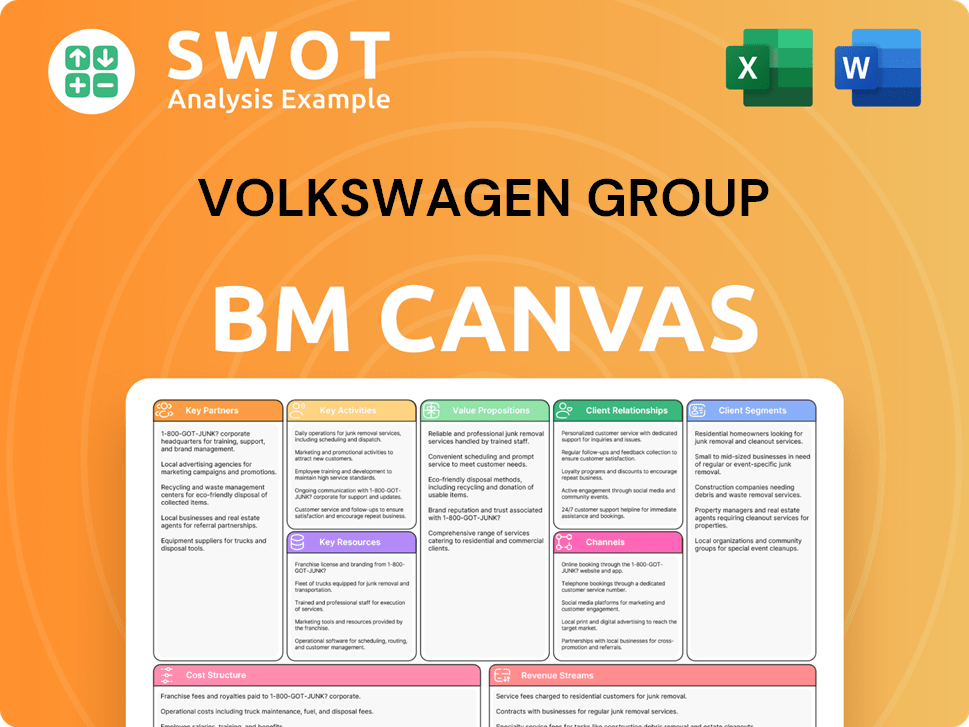
How Does Volkswagen Group Win & Keep Customers?
The Volkswagen Group employs a multi-faceted approach to customer acquisition and retention, utilizing a blend of traditional and digital marketing, sales tactics, and customer-focused initiatives. Their strategies are designed to attract new customers while fostering long-term loyalty. This approach is crucial for maintaining a competitive edge in the automotive industry.
For customer acquisition, the company leverages extensive marketing campaigns across various channels, including television, print, and outdoor advertising, particularly for new model launches and brand awareness. Digital marketing plays a significant role, with substantial investment in social media, SEO, and targeted online campaigns. Sales tactics include attractive financing options, leasing programs, and competitive pricing strategies, especially for its mass-market brands.
Customer retention strategies focus on building long-term relationships and brand loyalty through comprehensive after-sales service, extended warranties, and maintenance packages. Loyalty programs, often implemented at the dealership level, provide discounts on service, parts, or future vehicle purchases. The company also uses customer data and CRM systems for personalized communications and targeted offers.
Digital marketing is a cornerstone of Volkswagen’s customer acquisition strategy. They invest heavily in social media advertising, search engine optimization (SEO), and targeted online campaigns. These campaigns are designed to reach potential customers based on their online behavior and demographics. For instance, the 'Way to ZERO' campaign prominently features their electric vehicle lineup, targeting environmentally conscious consumers through digital platforms and sustainability-focused content.
Sales tactics include attractive financing options, leasing programs, and competitive pricing strategies. Dealership networks remain a vital touchpoint, offering test drives, personalized consultations, and after-sales support. For premium brands like Audi and Porsche, the acquisition strategy emphasizes exclusive events and bespoke customization options. In 2024, the company aimed to increase electric vehicle sales, offering incentives and promotions to drive adoption.
Customer retention is crucial for long-term success. Volkswagen focuses on building long-term relationships through comprehensive after-sales service, extended warranties, and maintenance packages. Loyalty programs are often implemented at the dealership level. The Volkswagen We Connect app enhances the customer experience by providing connected services, remote access, and vehicle health reports, contributing to retention by offering added convenience and value.
Volkswagen leverages customer data and CRM systems to segment its customer base and deliver personalized communications, service reminders, and targeted offers. Owners of specific models might receive tailored information about new accessories or software updates. This personalized approach enhances customer satisfaction and encourages repeat business. The shift towards digital engagement and personalized experiences has positively impacted customer loyalty.
Volkswagen utilizes a mix of marketing channels, including television, print, and outdoor advertising for brand awareness and new model launches. Digital marketing, including social media, SEO, and targeted online campaigns, is increasingly important. Influencer marketing is also used to build brand credibility. In 2024, the company increased its digital marketing spend by approximately 15% to reach a broader audience.
Sales tactics include attractive financing options, leasing programs, and competitive pricing strategies. Dealership networks offer test drives, personalized consultations, and after-sales support. For premium brands, exclusive events and bespoke customization options are emphasized. The focus is on providing a seamless and attractive purchasing experience. In 2024, financing and leasing accounted for a significant portion of sales, around 40%.
Loyalty programs, often implemented at the dealership level, offer discounts on service, parts, or future vehicle purchases. These programs help retain customers and encourage repeat business. The We Connect app enhances the customer experience by providing connected services and vehicle health reports. Customer loyalty programs have contributed to a 20% increase in repeat purchases.
Volkswagen leverages customer data and CRM systems to segment its customer base and deliver personalized communications, service reminders, and targeted offers. This data-driven approach allows for tailored interactions, improving customer satisfaction. Personalized communications have led to a 10% increase in customer engagement. The use of data analytics is crucial for understanding Revenue Streams & Business Model of Volkswagen Group.
There has been a notable shift towards digital engagement and personalized experiences. This is driven by the increasing availability of customer data and the need to differentiate in a competitive market. Digital engagement has positively impacted customer loyalty and lifetime value. The We Connect app and other digital tools are integral to this strategy.
Comprehensive after-sales service, extended warranties, and maintenance packages are key components of customer retention. These services ensure customer satisfaction and encourage loyalty. High-quality after-sales service has been shown to increase customer retention rates by approximately 15%. The focus on service helps build long-term relationships.
Volkswagen Group Porter's Five Forces Analysis
- Covers All 5 Competitive Forces in Detail
- Structured for Consultants, Students, and Founders
- 100% Editable in Microsoft Word & Excel
- Instant Digital Download – Use Immediately
- Compatible with Mac & PC – Fully Unlocked
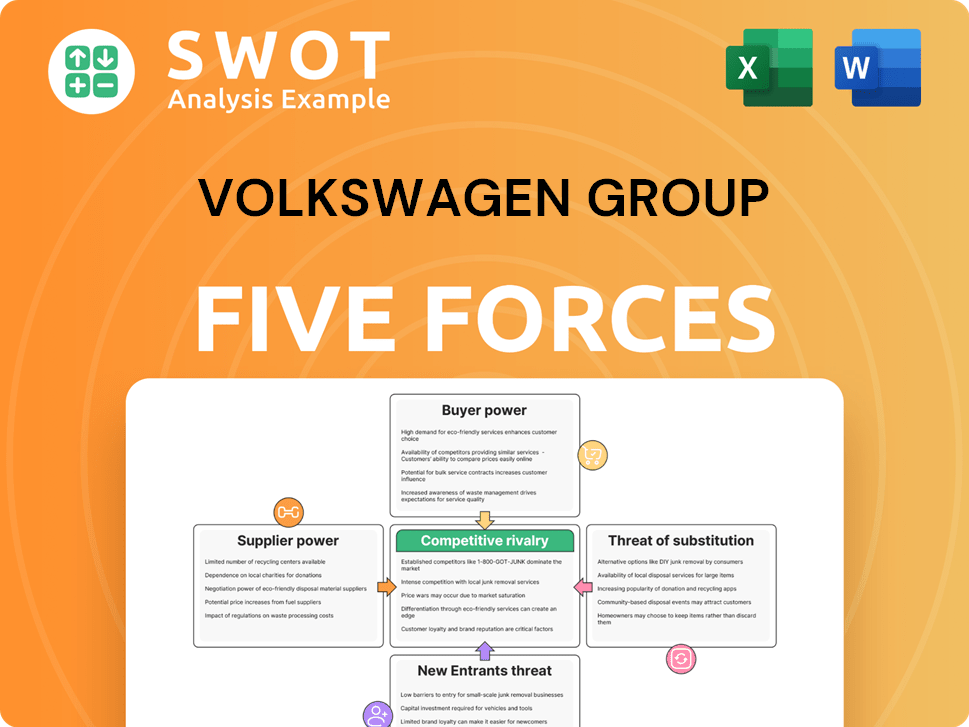
Related Blogs
- What are Mission Vision & Core Values of Volkswagen Group Company?
- What is Competitive Landscape of Volkswagen Group Company?
- What is Growth Strategy and Future Prospects of Volkswagen Group Company?
- How Does Volkswagen Group Company Work?
- What is Sales and Marketing Strategy of Volkswagen Group Company?
- What is Brief History of Volkswagen Group Company?
- Who Owns Volkswagen Group Company?
Disclaimer
All information, articles, and product details provided on this website are for general informational and educational purposes only. We do not claim any ownership over, nor do we intend to infringe upon, any trademarks, copyrights, logos, brand names, or other intellectual property mentioned or depicted on this site. Such intellectual property remains the property of its respective owners, and any references here are made solely for identification or informational purposes, without implying any affiliation, endorsement, or partnership.
We make no representations or warranties, express or implied, regarding the accuracy, completeness, or suitability of any content or products presented. Nothing on this website should be construed as legal, tax, investment, financial, medical, or other professional advice. In addition, no part of this site—including articles or product references—constitutes a solicitation, recommendation, endorsement, advertisement, or offer to buy or sell any securities, franchises, or other financial instruments, particularly in jurisdictions where such activity would be unlawful.
All content is of a general nature and may not address the specific circumstances of any individual or entity. It is not a substitute for professional advice or services. Any actions you take based on the information provided here are strictly at your own risk. You accept full responsibility for any decisions or outcomes arising from your use of this website and agree to release us from any liability in connection with your use of, or reliance upon, the content or products found herein.